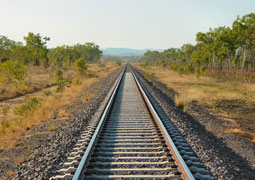
Participating in a parliamentary debate in the National Council of Provinces (NCOP) on the topic: “Building a reliable and safe passenger rail transport”, the Minister of Transport Mr Joe Maswanganyi announced that there is a R173bn investment towards the modernisation of South Africa’s railway system.
Addressing the NCOP delegates and Members of the Provincial Legislatures (MPLs), Mr Maswanganyi said government has “a clear programme to recapitalise and modernise rail services in South Africa to make sure that our rail services are reliable and safe”.
He said the Passenger Rail Agency of South Africa (Prasa) is contributing to reliable and safe passenger rail transport through a modernisation programme to the tune of R173bn.
The refurbishment of the existing fleet, depot modernisation and the signalling renewal programme in Gauteng, KwaZulu-Natal and the Western Cape regions are the initiatives that are correcting years of under-investment in passenger rail in South Africa.
To take the issue of investment in passenger rail to the next level, Prasa has commenced with its programme of modernising the commuter rail network in the country. The acquisition of new rail rolling stock to replace the ageing fleet accommodates the growth in passenger numbers. Improved passenger safety and energy efficiency are critical components of the modernisation programme and part of Prasa’s mandate.
The new fleet of rolling stock will be introduced in two 10-year cycles while the existing fleet is being phased out. New depots with the necessary equipment to maintain a modern fleet will be built and existing depots retained to maintain the existing fleet.
“We are also developing the national rail policy which is going to Cabinet soon. As the African National Congress government, we have the plans to improve rail services in South Africa,” he said.
Mr Maswanganyi said passenger rail as a mode of transport plays a critical role in socio-economic development. Passenger rail services are designed to move large numbers of commuters simultaneously between destinations. Commuter rail services in particular make the work centres and central business districts accessible to the country’s workforce, providing affordable transport at set times.
The Chairperson of the Select Committee on Economic and Business Development, Mr Mandla Rayi, said the ruling party made a commitment to the people of South Africa in 2014 that in the current term of government, world-class passenger trains would be introduced with new modern coaches to replace the outdated trains, bringing safety and comfort to the millions of commuters.
“Government is committed to work towards opening new passenger railway lines to connect our people in the new human settlements, rural areas and townships. Government’s undertaking to improve our public transport system is also aimed at creating many new jobs and contributing to skills development as locomotives and trains would be manufactured and assembled in South Africa,” he said.
With regard to the operational challenges such as the decline in fleet availability, the National Development Plan identified that South Africa needs reliable economical and smooth-flowing corridors linking its various modes of transport: road, rail, air, sea ports and pipelines.
These corridors are dominated by old railway technology that is prone to malfunction and poor inter-modal linkages. The passenger rail system in our country is faced with enormous operational challenges characterised primarily by the decline in fleet availability.
The agency’s current procurement of 600 train sets, coupled with rail industrialisation contractual obligations, is a key part of government’s programme to reindustrialise the economy. However, the sustainability of the industry requires that it does not only rely on demand from South Africa, but it should also have export potential. Hence Prasa’s reindustrialisation plan is premised on restoring the once dominant role of the manufacturing of Gauteng’s East Rand: a role that has been taken over by the services sector which has become the major contributor to the regional economy in the Ekurhuleni Metropolitan Municipality.
The rail industry is a key component of any functioning industrial economy. It is an important component in the logistics chain that is integral to our economy. It is critical to the future of South Africa and our industrialisation.
One of government’s priorities is to address the challenges that workers and commuters who depend on our passenger rail transport have been complaining about for a number of years: the lack of reliability and safety of the trains.
NCOP permanent delegate from the Northern Cape, Mr Willem Faber, said a reliable and safe passenger rail transportation system is a critical aspect of any society and the growth of its economy.
“Millions of South Africans rely on rail transport and their safety is of utmost importance. Government encourages South Africans to make use of public transportation like trains but, considering the unreliability and safety aspect of public transport, it is yet to be a viable option for many South Africans,” he said.
Mr Faber said factors such as the availability and good maintenance of resources also need to be considered when determining the viability of the current railways systems. He quoted a case study which was done on the reliability of Metrorail rolling stock, which he said found that Metrorail operates an ageing fleet of trains of which some have been in use since 1958. Metrorail then makes use of cancellations and delays as reliability measures for their fleet.
“Speaking to commuters on the Cape Metro trains, you will understand their fear of gangs boarding the trains, robbing passengers, and being stabbed or cut by knives on a trip. While we acknowledge that crime plays a role and has a negative impact on the railway infrastructure, what with the theft of rails, sleepers and cables leading to derailments, we have a duty to ensure the continuous maintenance of trains and the safety of commuters,” he said.
KwaZulu-Natal delegate to the NCOP, Mr Mntomuhle Khawula, said: “South Africa records one of the highest road fatalities per year as compared to other countries in the world. This is one among many reasons why there is a great need to build a reliable and safe passenger rail transport. In 2016, 14 071 people died on the South African roads. This was an increase of 9% on the 2015 figure of 12 944 road fatalities in South Africa.
“Whilst passenger rail transport provides no guarantees that fatal accidents will not happen, it is however rated as one of the safest modes of transport around the world. Our rail system is also not reliable in terms of time and not ideally convenient for daily commuters to and from work. Damage to rail infrastructure in the form of cable theft and other forms render the rail service totally unreliable. The train schedules in-between the different cities of our country render the network inefficient for reliable usage.
“The types of coaches used have not changed much from the apartheid-era coaches which were designed to suppress human dignity of the then third-class citizens. Graffiti and illegal advertising pasted all over the coaches of our trains render the rail environment so unfriendly and un-welcoming to use,” he said.
Free State delegate, Mr Makosini Chabangu, said passenger rail transport in this country is that it is neither safe nor reliable. This is why the rich do not take trains because they do not have to.
By Sakhile Mokoena
20 October 2017

